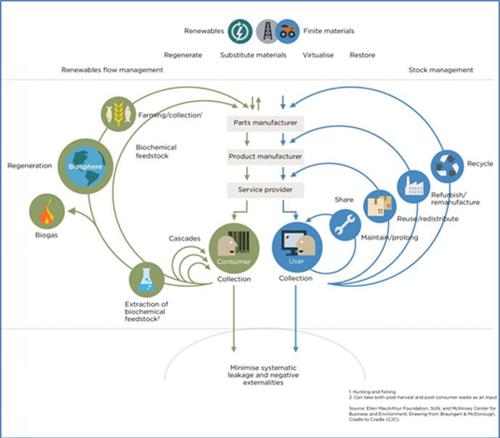Managing your waste for a circular economy - recycling and beyond
Landfilling materials, which are no longer fit for purpose or which we no longer want, means those materials are effectively lost from our society. We are not getting maximum value from them.
We need to rethink our approach to how goods are supplied, how they are used and what happens at the end of a product’s life. We need to keep materials, components and products in use (in a high value state) for as long as possible.
This way of thinking applies to how we manage our food wastes and other bio-based resources and wastes. This includes anaerobic digestion, composting or bio-refining. These enable the recirculation of nutrients, whilst avoiding harmful greenhouse gases. Some of these technologies can be used to produce energy. To further support the transition to a circular economy we need to increase the proportion of bio-based wastes used for the production of high value materials and chemicals.
VIDEO - Celtic Renewables: Biobutane
How this can benefit your business
- reduces your cost of waste disposal to landfill
- reduces your impact on the environment
- increases your competitiveness.
What you can do
Find the highest value market for your unwanted materials, components and products and prioritise reuse, then repair, then remanufacturing, before recycling:
Reuse products and find new users for your unwanted items – by donating items and online exchanges
- NI Direct: Cutting waste, reusing and repairing, and donating
- Zero Waste Scotland: Reuse Tool (collection of large items for reuse)
- Creative Carbon Scotland: Green reuse and waste suppliers, with a focus on the Theatre industry
- R:evolve Recycle: Clothing - alterations and repair, swap and reuse (Scotland)
- Zero Waste Scotland: Donate unwanted items to charities
Segregate your materials to get best value
- Prevent contamination of your waste materials
- Keep any electrical or electronic equipment dry
Discuss options with your waste management contractor
Find reuse and recycle services in your area. See, for example:
- Recycle Now – local recycling
- NI Direct: Recycling in your area
- Zero Waste Scotland: Find Reuse and Recycling services in your area
Explore innovative uses for your waste streams
In Northern Ireland refer to GOV.UK for information on quality protocols for materials that are no longer waste.
In Scotland, to establish if a material or product is waste or is no longer considered waste, refer to SEPA’s regulatory guidance documents about ‘Is it waste’ and End-of-waste criteria for a number of materials.
Also, see the pages in this guideline about Reuse, Repair, Remanufacturing and Recycling
Further information
 The Ellen MacArthur Foundation was established in 2010 with the aim of accelerating the transition to a Circular Economy. Their system diagram illustrates the continuous flow of technical and biological materials through the ‘value circle’:
The Ellen MacArthur Foundation was established in 2010 with the aim of accelerating the transition to a Circular Economy. Their system diagram illustrates the continuous flow of technical and biological materials through the ‘value circle’:
